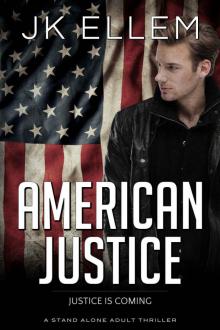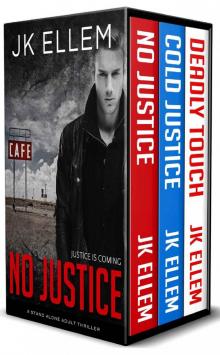No Justice; Cold Justice; Deadly Touch Read online
The No Justice Box Set
No Justice, Cold Justice, Deadly Touch
JK Ellem
Copyright © 2018 by JK Ellem
No Justice, Cold Justice and Deadly Touch are works of fiction. All incidents, dialogue and all characters are products of the author’s imagination and are not to be construed as real. Any resemblance to persons living or dead is entirely coincidental.
All rights reserved. In accordance with the U.S. Copyright Act of 1976, the scanning, uploading and electronic sharing of any part of these books without the written permission of the publisher is unlawful piracy and theft of the author’s intellectual property.
No part of these books may be reproduced, stored in a retrieval system or transmitted in any form or by any means, without the prior permission in writing of the publisher, nor to be otherwise circulated in any form of binding or cover other than that in which it is published without a similar condition, including this condition, being imposed on the subsequent purchaser.
Copyrighted Material
www.jkellem.com
JK Ellem on Facebook
Here’s to you sitting back, relaxing and enjoying a great adventure!
JK Ellem
Contents
Books by JK Ellem
No Justice
Chapter 1
Chapter 2
Chapter 3
Chapter 4
Chapter 5
Chapter 6
Chapter 7
Chapter 8
Chapter 9
Chapter 10
Chapter 11
Chapter 12
Chapter 13
Chapter 14
Chapter 15
Chapter 16
Chapter 17
Chapter 18
Chapter 19
Chapter 20
Chapter 21
Chapter 22
Chapter 23
Chapter 24
Chapter 25
Chapter 26
Chapter 27
Chapter 28
Chapter 29
Chapter 30
Chapter 31
Chapter 32
Chapter 33
Chapter 34
Chapter 35
Chapter 36
Chapter 37
Chapter 38
Chapter 39
Chapter 40
Chapter 41
Chapter 42
Chapter 43
Chapter 44
Chapter 45
Chapter 46
Chapter 47
Cold Justice
Prologue
Chapter 1
Chapter 2
Chapter 3
Chapter 4
Chapter 5
Chapter 6
Chapter 7
Chapter 8
Chapter 9
Chapter 10
Chapter 11
Chapter 12
Chapter 13
Chapter 14
Chapter 15
Chapter 16
Chapter 17
Chapter 18
Chapter 19
Chapter 20
Chapter 21
Chapter 22
Chapter 23
Chapter 24
Chapter 25
Chapter 26
Chapter 27
Chapter 28
Chapter 29
Chapter 30
Chapter 31
Chapter 32
Chapter 33
Chapter 34
Chapter 35
Chapter 36
Chapter 37
Chapter 38
Chapter 39
Chapter 40
Chapter 41
Chapter 42
Chapter 43
Chapter 44
Chapter 45
Chapter 46
Chapter 47
Chapter 48
Chapter 49
Chapter 50
Chapter 51
Chapter 52
Chapter 53
Deadly Touch
1. The Lake House
2. The Assignment
3. Zurich to Vienna
4. The Smile
5. A Brutal Death
6. Denis Philip Ratchford
7. Wire
8. The Bridge
9. The Fall
10. An Angry Woman
11. American Justice - Cover
12. American Justice - Synopsis
If you enjoyed these books
Books by JK Ellem
No Justice Series:
Book 1No Justice
Book 2Cold Justice
Book 3American Justice
Book 4Hidden Justice - fall 2018
Deadly Touch Series:
Fast Read Deadly Touch
Octagon Trilogy (Dystopian Thriller Series):
PrequelSoldiers Field
Book 1Octagon
Book 2Infernum
Book 3Sky of Thorns - coming 2019
Box Sets - only available on Amazon
Dystopian Thriller Box Set
The Octagon Trilogy: Soldiers Field, Octagon, Infernum
The No Justice Series Box Set
No Justice, Cold Justice, Deadly Touch
To buy my books go to:
Amazon Kindle
Apple iBooks
Kobo
www.jkellem.com
1
The Home Depot didn’t sell plastic drums big enough to fit a body inside.
The sulfuric acid was sourced from a janitorial supply company out of Austin, Texas and they had plenty left over from last time. But all they had were the standard-sized drums and Linton was a tall guy, long-limbed and gangly. In the battle between femur and crowbar, crowbar won out. So they broke both his legs before they folded him into the drum, topped him off with the acid and sealed the heavy-duty plastic lid.
The three men wore disposable coveralls, long thick rubber aprons, rubber gloves, and full-face respirators.
It took two of them to load the drum onto the hand-truck then wheel him into the vault. The vault was a five by five room with plain concrete walls, and a smooth grey-painted floor that the rubber tires of the hand-truck squelched over as they slotted him in between the other drums.
The vault room was in an old abandoned bank building the family owned. It was located on the fringe of the old town where the main commercial hub used to be until progress pulled the shoppers east to where new stores, a mall and a small-business center were built. New homes sprouted up around the hub of shops and eateries, and the town shifted a mile or so up the main road leaving behind the run-down empty carcass of its former self. The old town was now just a desolate stretch of unkempt dirt blocks, cracked sidewalks and empty stores boarded-up with plywood. Like most Midwestern small towns there was always a previous version of itself, hiding on the fringe like an abandoned child sulking amongst the weeds and decay.
The bank had closed the branch soon after the GFC, the town too small to justify the expense of keeping the doors open. Men in suits sitting around a mahogany boardroom table in Charlotte, North Carolina made that decision as they watched their bonus payments disappear when the stock price tanked.
The three workers closed the heavy iron door of the vault room then changed out of their protective clothing, leaving the coveralls, aprons and respirators hanging neatly in an empty side office.
It was close to 9:00 p.m. when they finally emerged from the back of the bank building and locked the door. One of the men did a final walk-around the building just to make sure it was secure before they got into their pickup truck parked in the darkness of the dirt lot at the rear. They didn’t turn on the headlights un
til they hit the main road and headed back towards downtown.
2
The greyhound bus limped into the parking lot of the gas station, a mechanical rattling and a trail of smoke coming from its rear engine compartment. The driver did a tight turn and parked near the entrance of the workshop away from the gas bowsers and the mid-morning customers filling up their pickup trucks and SUVs.
The bus settled with a hiss of its air brakes and the front doors swung open with a grind of hinges in need of lubrication.
Hesitantly at first, like visitors from another planet arriving on an unknown world, the first few passengers disembarked, and heads turned to look around at the unexpected stop in their travels. The first few spotted the diner adjacent to the gas station store. Discontent and grumpiness gave way to the hope of hot coffee and calorie-dense food. Word made it back up the line of passengers and into the bus like a telegraph and the slow shuffle increased to a moderate walk off the bus and across the concrete apron like ants forming a determined line towards a crumb of food.
When nearly all the passengers had spilled out, the last passenger, a man, disembarked pausing on the last step, like he was contemplating if the ground below was concrete or quicksand. Sometimes it was good to be last, that way you could watch the mistakes of all those who had rushed in before you. You can watch them from afar. Watch what they do well and watch what they get wrong. Then you can proceed knowing you can make a more informed decision.
It wasn’t that the last man off the bus was slow, or tired or old. He preferred the back of the bus. From there you can see everyone and no one can really see you. More emergency exits were located near the back as well, especially on the older Greyhounds like this one. Life had taught him to know where the exits were and to always be close to them. Mayhem and suffering could often be avoided if you were a few feet closer to an unlocked door or window.
The man still paused. Assessing, not hesitating.
He preferred caution, not rashness.
Prudence in moments of total uncertainty was a trait the man considered to be of infinite value. He had learned that lesson the hard way. Lives had been lost. People he had cared about.
The man looked nothing special, just someone who blended in. Definitely not a tourist. He was someone who preferred traveling across the ground and not through the air. Someone who didn’t throw caution to the wind hoping that it wouldn’t blow back in his face.
Just an average man of slightly average height and build. Lean, not thin. Strong-framed, but not gym-junkie bulky. He wore oil-tanned leather work boots, well-worn dark jeans and a weathered leather jacket over a ubiquitous black T-shirt. Muted colors. Woodland colors. Like camouflage.
Blend in.
Ben Shaw finally stepped down, planted both feet on the ground and looked around some more, taking in the sights, the sounds, the smells.
The sky was a glorious expanse of clear blue that stretched upwards forever, deepening in color and texture the higher it went. The air was cool and crisp, untainted and fresh. Nothing like you would get in the city until the fall.
They had come off Interstate 70 west just after Salina. The driver had announced that they were going to detour along the back-roads because of road works ahead, but they should still get to Denver on time. It was just over six hundred miles, a nine-hour trip from Kansas City where Shaw boarded the Greyhound early this morning. He was looking forward to catching some shut-eye along the way or just letting his mind wander as the bus passed endless miles of open farming land of wheat, corn and sorghum.
But then the bus burst a hose on the back-road and the trip took a temporary halt as they made their way to the nearest gas station.
Shaw slung a small brown canvas rucksack over his shoulder and made his way towards the diner.
A few drivers were bent over, pumping gas, the sound of the dials clicking over on the old bowsers. Mainly rural vehicles, pickup trucks carrying tools, planks of lumber and bales of hay in the back, and the odd SUV with a roof box. Shaw made a mental note of faces, makes and models and registrations, as he passed by.
Old habits die hard.
The gas station was one of the older ones, a retro throwback to the sixties, but kept in perfect condition by a proprietor still proud about appearances. Neat, tidy, and clean on the outside with the promise of good old fashioned customer service. Shaw preferred these establishments rather than the newer, larger franchises typically found every few miles along the main interstates. There was a certain look and feel to these traditional places that Shaw admired and respected, something that couldn’t be replicated with bright plastic signage, corporate colors, or with inflatable air dancing tube men and food pre-made off site then trucked in to be reheated.
Shaw passed neat racks of propane gas bottles, plastic bags of cut logs, quarts of oil in glass bottles and vertical stacks of tires at discount prices.
Next to the gas station store was a mechanics workshop, the gloomy front yawned wide open like a cave, shadows moved between oil-stained hoists, the sound of power ratchets, tools being dropped accompanied by a barrage of profanity.
Shaw reached the diner, pulled open the glass door and entered. The air was warm and cozy inside, and smelt of coffee, fried food and pancakes. The floor was checkered in the black and white tile found in thousands of similar diners across the country. On the left past the cashiers desk was the kitchen with a long rectangular serving opening where plates of food sat ready and steaming on the ledge, and yellow order slips hung from above. The sound of frying, the clattering of pots, pans and kitchen utensils being put to good use, drifted through the opening.
A counter of red laminate roll-top ran almost the entire length of the diner with a row of padded red top swivel stools in chrome plated steel. A scatter of people sat at the counter sipping coffee or eating breakfast, or reading the paper. On the right against the large floor-to-ceiling windows were cubicles made from the same padded red vinyl with red laminate tabletops.
Shaw took a seat in the far corner booth, back to the wall, near the fire exit, with a clear view of the diner in front and of the parking lot to his left through the glass.
Sit where you have an uninterrupted view of everyone and close to an exit. No matter where he was, it was always the same.
He placed his rucksack beside him, took off his aviator sunglasses and placed them carefully on the table next to the condiments stand. Some of the bus passengers, retirees Shaw guessed, were milling around at the counter, menus in hand, deciding what to have as though it was their last supper. Maybe it was. An older Asian couple from the bus, dressed in brightly colored matching tracksuits, had taken a booth two up from Shaw and they scrutinized the menu too.
A young waitress came over carrying a glass coffee pot in one hand and a white cup and saucer in the other. Neat and tidy, crisp uniform, clean apron with just a hint of starch.
She was pretty. Very pretty. Too pretty for this place.
She smiled at Shaw, placed the cup and saucer on the table in front of him and poured steaming hot coffee.
“But I haven’t ordered anything yet,” Shaw said.
“You look like the coffee type,” she said, her smile never leaving her face as she expertly poured the coffee. She placed the pot down on the table and pulled out an order pad from her front apron pocket and a pen from behind her ear. She'd decided to serve him first despite the others being there before him.
Good old fashioned pen and paper. Shaw liked that. He was in a bar a few days ago in Kansas City and the waitress had pulled out some fancy hand-held device and tapped his order into it. Nearly an hour later his meal came that was completely wrong and the woman expected a tip.
The menu was wedged between the ketchup and mustard on the condiments caddy, but he didn’t need to look at it. Every diner had what he wanted and from the sound that had come from the engine bay of the bus, it was going to take more than a quick toilet-stop to fix whatever was wrong. So he ordered steel-cut oats, no brown sugar,
just a little cinnamon, and some half and half for his coffee, no sugar, no sweetener.
“You from the bus?” the waitress asked, still smiling down at him, giving him the once over.
“Yes I am. Don’t know how long it will be,” Shaw replied. Her name badge said Callie. She was slim, had dark brown hair pulled back in a bun, dark brown eyes, long eyelashes and a petite nose with a smattering of freckles. Shaw guessed she was around twenty-five, maybe slightly older.

 American Justice
American Justice Hidden Justice
Hidden Justice No Justice; Cold Justice; Deadly Touch
No Justice; Cold Justice; Deadly Touch